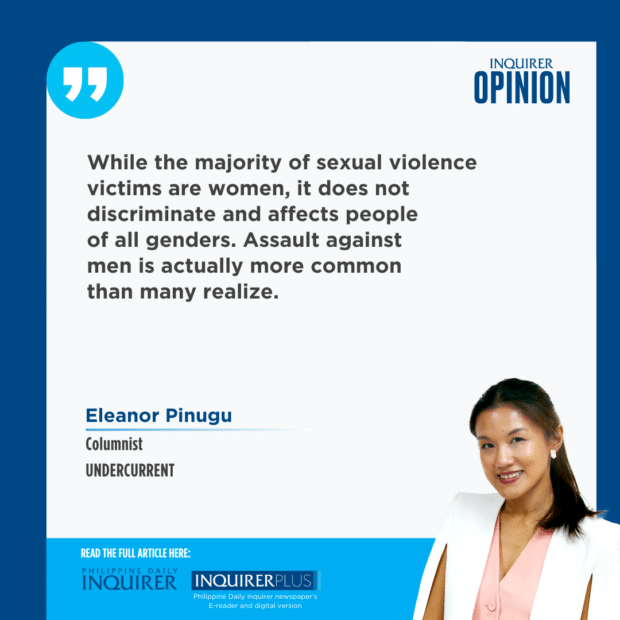Abuse knows no gender

Amid the celebratory headlines about gymnast Carlos Yulo’s Olympic victory, a disturbing story has emerged from the entertainment industry. Sandro Muhlach, son of former child star Niño Muhlach, recently filed a formal complaint at the National Bureau of Investigation for the alleged sexual abuse he experienced from two GMA network executives at a gala event.
While the majority of sexual violence victims are women, it does not discriminate and affects people of all genders. Assault against men is actually more common than many realize. Apart from Muhlach, other prominent male figures were also emboldened to discuss their experiences. Stand-up comedian Victor Anastacio shared in his podcast how he was sexually assaulted while working on one of his projects. Internationally acclaimed visual artist Leeroy New used his online platform to open up about the abuse he experienced from two marketing and advertising executives. It is worth noting that Muhlach, Anastacio, and New all had some form of professional relationship with their assailants, highlighting the exploitation of power dynamics that often occurs during these cases.
The prevalence of sexual violence in the country is alarming. The National Baseline Study on Violence Against Children reported that 17.1 percent of Filipinos aged 13 to 17 experienced sexual violence while the Philippine Commission on Women (PCW) found that one in 20 girls and women have experienced sexual violence in their lifetime. Given the underreporting of such crimes, these figures likely represent only a fraction of the actual cases. The unwillingness to speak up is rooted in common reasons: delayed recognition and acceptance of the abuse, shame in being victimized, and the difficulty in producing proof of the abuse.
Article continues after this advertisementVictim blaming exacerbates this silence, as survivors are often held responsible for their victimization leading to internalized feelings of blame. These include comments and questions regarding what they were wearing during the assault, whether they were under the influence of alcohol, and whether they did anything to “tempt” their perpetrator. Research shows that victim-blaming extends to supposed support structures like law enforcement, legal professionals, and health-care providers, discouraging survivors from seeking further support, treatment, and justice.
In his podcast, Anastacio highlighted another layer of victim-blaming that men often experience. Society expects men to be strong and invulnerable. When straight men talk about their experiences, they are usually shamed for not fighting back. In relation to this, non-consensual touching of male’s private parts has also been normalized by some as a way for an alpha male to dominate another man—perpetuating toxic masculinity that increases vulnerability to abuse for all genders.
For the LGBTQ+ community, societal prejudices further complicate the recognition and validation of abuse. As New pointed out, gay men often face additional layers of disbelief and stigmatization: “Many people believe that being gay means you are signing up for a promiscuous lifestyle. They easily dismiss the complaints of survivors as something that’s an inevitable part of the ‘gay experience’ and something they should just tolerate.”
Article continues after this advertisementEducational efforts are essential in broadening public understanding of abuse and assault, from ensuring people understand the full spectrum of sexual assault to recognizing that each survivor’s response is unique and equally valid. There should also be more training initiatives focused on dispelling victim-blaming beliefs among parents, law enforcement, medical responders, and media practitioners to foster a more supportive environment for survivors seeking help and validation.
Breaking the silence around sexual abuse and assault is not just about raising awareness; it is also about amending laws that can capture the nuances of manipulative situations that enable abusive behaviors to thrive. PCW has repeatedly called for existing laws to be amended to focus more on consent (or the lack thereof) as the main factor in determining rape. PCW further defined consent as a voluntary agreement to engage in sex only if: a) the person fully understands what’s being proposed; b) both parties agree voluntarily; and c) both parties are competent.
Consent-based definitions provide better legal protection for victims because they address the complexities surrounding power dynamics, coercion, and victim agency. This includes situations where individuals may feel pressured or threatened, such as in relationships involving power imbalances (e.g., teacher-student, employer-employee), as well as situations where individuals are left vulnerable or incapacitated due to intoxication, mental disabilities, and other factors compromising their ability to provide valid consent.
Perpetrators enjoy impunity because societal attitudes toward sexual violence have always blamed victims. It is time we change our laws and our mindsets to correct that.















